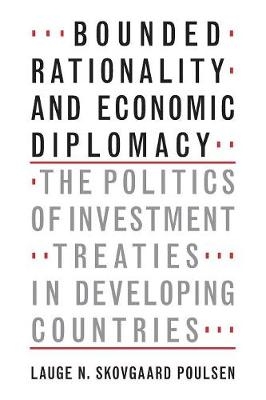
Bounded Rationality and Economic Diplomacy
The Politics of Investment Treaties in Developing Countries
Seiten
2017
Cambridge University Press (Verlag)
978-1-107-55201-2 (ISBN)
Cambridge University Press (Verlag)
978-1-107-55201-2 (ISBN)
Investment treaties have empowered foreign investors to file expensive, controversial, and wide-ranging claims against sovereign states. This book examines why and how the treaties were negotiated based on a novel theory of economic diplomacy rooted in behavioural economics and psychology.
Modern investment treaties give private arbitrators power to determine whether governments should pay compensation to foreign investors for a wide range of sovereign acts. In recent years, particularly developing countries have incurred significant liabilities from investment treaty arbitration, which begs the question why they signed the treaties in the first place. Through a comprehensive and timely analysis, this book shows that governments in developing countries typically overestimated the economic benefits of investment treaties and practically ignored their risks. Rooted in insights on bounded rationality from behavioural psychology and economics, the analysis highlights how policy-makers often relied on inferential shortcuts when assessing the implications of the treaties, which resulted in systematic deviations from fully rational behaviour. This not only sheds new light on one of the most controversial legal regimes underwriting economic globalization but also provides a novel theoretical account of the often irrational, yet predictable, nature of economic diplomacy.
Modern investment treaties give private arbitrators power to determine whether governments should pay compensation to foreign investors for a wide range of sovereign acts. In recent years, particularly developing countries have incurred significant liabilities from investment treaty arbitration, which begs the question why they signed the treaties in the first place. Through a comprehensive and timely analysis, this book shows that governments in developing countries typically overestimated the economic benefits of investment treaties and practically ignored their risks. Rooted in insights on bounded rationality from behavioural psychology and economics, the analysis highlights how policy-makers often relied on inferential shortcuts when assessing the implications of the treaties, which resulted in systematic deviations from fully rational behaviour. This not only sheds new light on one of the most controversial legal regimes underwriting economic globalization but also provides a novel theoretical account of the often irrational, yet predictable, nature of economic diplomacy.
Lauge N. Skovgaard Poulsen is a Lecturer in International Political Economy at University College London.
Preface: the curious case of Pakistan; 1. Unanticipated consequences; 2. Bounded rationality and the spread of investment treaties; 3. A difficult beginning; 4. Promoting investment treaties; 5. A less then rational competition; 6. Narcissistic learning; 7. Letting down the guard: a case study; 8. Expanding the bounds of rationality in the investment regime.
| Erscheinungsdatum | 07.06.2017 |
|---|---|
| Zusatzinfo | 15 Tables, black and white; 15 Line drawings, black and white |
| Verlagsort | Cambridge |
| Sprache | englisch |
| Maße | 153 x 230 mm |
| Gewicht | 400 g |
| Themenwelt | Recht / Steuern ► EU / Internationales Recht |
| Sozialwissenschaften ► Politik / Verwaltung ► Europäische / Internationale Politik | |
| Sozialwissenschaften ► Soziologie | |
| Wirtschaft ► Volkswirtschaftslehre ► Makroökonomie | |
| Wirtschaft ► Volkswirtschaftslehre ► Wirtschaftspolitik | |
| ISBN-10 | 1-107-55201-X / 110755201X |
| ISBN-13 | 978-1-107-55201-2 / 9781107552012 |
| Zustand | Neuware |
| Haben Sie eine Frage zum Produkt? |
Mehr entdecken
aus dem Bereich
aus dem Bereich
Studienbuch
Buch | Hardcover (2023)
De Gruyter Oldenbourg (Verlag)
CHF 62,90
erfolgreiche Interessenvertretung durch Prozesskompetenz im komplexen …
Buch | Hardcover (2023)
Wiley-VCH (Verlag)
CHF 58,75


